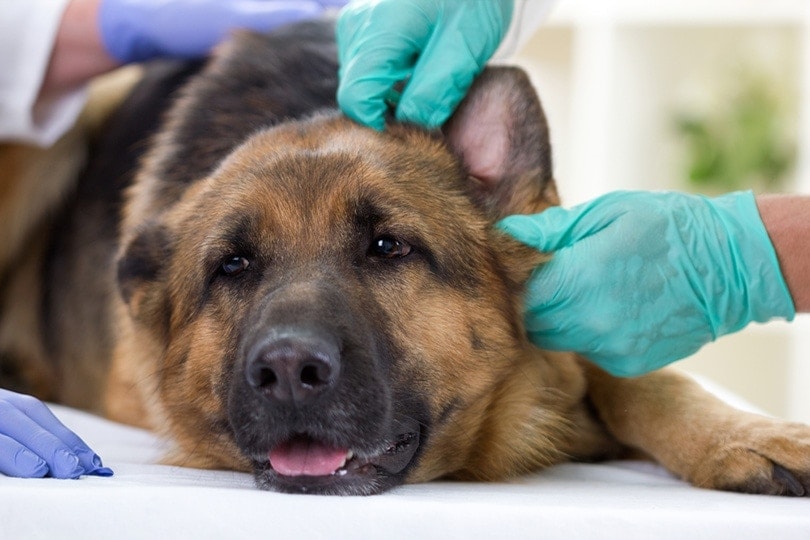German Shepherd Floppy Ears FAQ: The Complete Guide

Updated on

The quintessential picture of the German Shepherd speaks to the breed’s courage and poise. Suffice to say that the dog has come a long way from its herding roots. Part of that perfect picture we have of these pups is the erect position of their ears. It gives them the qualities we associate with the breed, such as intelligence and confidence. On the other hand, floppy ears strike us as a disconnect.
Nonetheless, it’s essential to put the matter in context. There is likely more to your German Shepherd’s floppy ears than you may realize. Our list of FAQs will address the most common concerns people have about their pup’s floppy ears.
Why Do Some German Shepherds’ Ears Not Stand Up?
Several reasons can explain why a German Shepherd’s ears flop down instead of standing upright. If they’re a puppy, it may merely mean that the cartilage isn’t strong enough to make them stand up. These dogs have a dense coat that puts a lot of weight on their ears, relatively speaking. Also, large breeds like the German Shepherd mature more slowly than smaller dogs. It could just be a matter of time before they pop up.

It’s in the Breeding Stock
The German Shepherd is the fourth most popular breed, according to the American Kennel Club (AKC). That fact will come into play with the availability and price of the dog. A purebred puppy will likely run you close to $1,000. However, if you’re opting for one from a championship line, you can easily pay up to five figures.
The chances are that if you are paying on the low end of the spectrum, you might be getting a dog that isn’t show quality. It may have a disqualifying trait, such as floppy ears. This characteristic has a genetic component. If one or both parents had ears that didn’t stand erect, your pet may have inherited it. If that’s the case, there may not be a whole lot you can about it.
Injury or Trauma Damaged the Cartilage
Puppies sometimes play rough. They bite at each other, and sometimes the ears get the brunt of it. Cartilage differs from the skin in that it isn’t highly vascularized. That means there aren’t like many blood vessels supplying nutrients going through them as other parts of your dog’s body. That often translates into slower healing times. Again, patience is the key if that’s the problem.
You can support the healing process and your pet’s proper development by feeding your pup a healthy diet. Some manufactures produce tailor-made foods for specific breeds, such as the German Shepherd. That can go a long way to helping your dog recovering from an injury.

An Ear Infection May Be the Cause
German Shepherds are susceptible to ear infections because of their dense fur. It can interfere with air circulation in the ear canals, setting up the perfect storm for infections or mites. These conditions are horribly uncomfortable for your pup. You’ll often notice that an affected animal will paw at their ears a lot or shake their head. Left untreated, it can cause a hematoma or swelling.
This condition requires veterinary treatment. Several options exist, from aspirating or draining it to surgery. The best prevention is avoiding the conditions that caused the ear discomfort in the first place. That often means cleaning your German Shepherd’s ears regularly.
What Percentage of German Shepherds Have Floppy Ears?
All German Shepherds have floppy ears as puppies. The difference depends on when they start to change and stand up into their adult position. It can take several months. However, the number of adult dogs with floppy ears is about one in five. The cause is typically one of the culprits we’ve already discussed.
Is It Bad to Touch a German Shepherd Puppy’s Ears?
Handling your pup’s ears isn’t bad. On the contrary, it’s beneficial. It’ll make cleaning your pet’s ears more manageable, especially if you create a positive association with this grooming task with a treat. You may find it helpful to massage your puppy’s ears gently to encourage blood circulation. That may get its ears standing upright quicker.

Is Taping the Ears a Possible Solution?
Taping the ears is usually part of the healing process when dogs get their ears cropped. It’s worth noting that the American Veterinary Medical Association (AVMA) opposes this practice for cosmetic reasons. It’s done sometimes for medical purposes with pets with chronic ear problems. You can use taping to provide extra support for your German Shepherd’s ears with a few caveats.
We don’t recommend it for younger pets simply because the ear position may still change on its own. The other concern is doing the procedure correctly. A puppy isn’t likely to sit still while you tape their ears. It’s also a double-edged sword. It may get the ears to stand up, but your pup isn’t going to make it easy.
They’ll likely paw at the bandaging without using an Elizabethan or e-cone collar. That could lead to ear trauma or a bowel obstruction if they swallow the materials. We suggest that you have your veterinarian do the job if you want to go this route, although we don’t recommend or encourage it.
Final Thoughts
The upright ears are an essential feature of the striking pose of the German Shepherd. Nature often has a plan for when that will happen in a puppy. Sometimes, it takes longer in pups with thicker fur or large ears. Healthy nutritional support will help the cartilage develop stronger and quicker. In the meantime, patience is the key. If it’s going to happen, you should see it by 9–10 months old.
See also:
Featured Image Credit: M J, Pixabay












